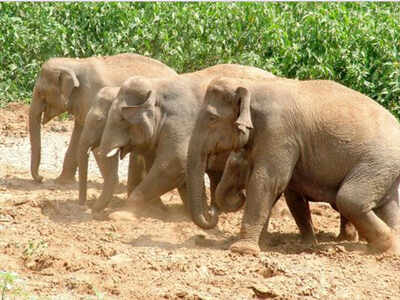- News
- City News
- mysuru News
- Jumbo menace pushing Hassan farmers to abandon agriculture
Jumbo menace pushing Hassan farmers to abandon agriculture

Picture for representational purpose only.
HASSAN: The perpetual man-animal conflict at Sakleshpur-Alur region in Hassan district could push farmers to abandon agriculture.
The fragmented elephant corridor has forced jumbos to venture into the agricultural fields, thereby damaging crops.
“Farmers have become tired of the movement of elephants. In an estate spread over nearly 90 acres at Kirehalli, this year, they incurred a loss of about Rs 30-35 lakh. A herd of elephants recently damaged banana and areca crops in around 4 acres. On Tuesday, we had 22 elephants at a plantation. The workers are scared to enter the plantation. In fact, when they agree to work, we have to ensure two employees climb the trees to watch the movement of elephants and alert the others. Besides the crop damage, we have elephants trampling over sprinklers, pipes, fence and gate,” said Prasad Raxidi, an activist.
“All the planters are facing the same problem which has intensified since last year. Elephants come near our houses. It’s very difficult to even harvest some fruits. Sakleshpur region should be given special status considering it is a hilly terrain. This will help us in getting more funds to adopt suitable measures to end the conflict. Currently Sakleshpur is one of the taluks in the assembly constituency which includes Alur taluk and Kattaya hobli. It was demarcated considering population in 2008, but this region needs demarcation to be done considering geographical area owing to its terrain,” Raxidi added.
“Soon a delegation will be formed from Hassan and Chikkamagaluru districts to meet Union forest minister Bhupendra Yadav and PM Narendra Modi seeking permanent solution to end the conflict,” said Sakleshpur MLA HK Kumaraswamy.
At a recent meeting held at Belur by coffee growers, they urged the state government to either come up with a permanent solution or to take control of their plantations. They also requested the governement to conduct a thorough scientific study of elephant movements.
The fragmented elephant corridor has forced jumbos to venture into the agricultural fields, thereby damaging crops.
“Farmers have become tired of the movement of elephants. In an estate spread over nearly 90 acres at Kirehalli, this year, they incurred a loss of about Rs 30-35 lakh. A herd of elephants recently damaged banana and areca crops in around 4 acres. On Tuesday, we had 22 elephants at a plantation. The workers are scared to enter the plantation. In fact, when they agree to work, we have to ensure two employees climb the trees to watch the movement of elephants and alert the others. Besides the crop damage, we have elephants trampling over sprinklers, pipes, fence and gate,” said Prasad Raxidi, an activist.
“All the planters are facing the same problem which has intensified since last year. Elephants come near our houses. It’s very difficult to even harvest some fruits. Sakleshpur region should be given special status considering it is a hilly terrain. This will help us in getting more funds to adopt suitable measures to end the conflict. Currently Sakleshpur is one of the taluks in the assembly constituency which includes Alur taluk and Kattaya hobli. It was demarcated considering population in 2008, but this region needs demarcation to be done considering geographical area owing to its terrain,” Raxidi added.
“Soon a delegation will be formed from Hassan and Chikkamagaluru districts to meet Union forest minister Bhupendra Yadav and PM Narendra Modi seeking permanent solution to end the conflict,” said Sakleshpur MLA HK Kumaraswamy.
At a recent meeting held at Belur by coffee growers, they urged the state government to either come up with a permanent solution or to take control of their plantations. They also requested the governement to conduct a thorough scientific study of elephant movements.
FacebookTwitterLinkedinEMail
Start a Conversation
end of article
Quick Links
Delhi Air PollutionDelhi TemperatureChennai WeatherBangalore TemperatureCovid vaccination centres in DelhiCoronavirus in DelhiRTPCR test in GurgaonHyderabad RainPollution level in BangaloreDelhi SmogDelhi TemperatureNoida AQIGurgaon AQI todayFire in MumbaiMumbai RainsCovid 19 RT PCR Test in NoidaDelhi AQI todaySrinagar encounter

